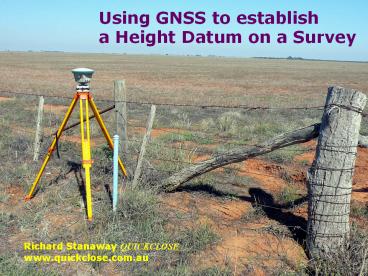Using GNSS to establish - PowerPoint PPT Presentation
Title:
Using GNSS to establish
Description:
Using GNSS to establish a Height Datum on a Survey Richard Stanaway QUICKCLOSE www.quickclose.com.au Overview of GNSS Heighting Height systems and Geoid models AHD ... – PowerPoint PPT presentation
Number of Views:175
Avg rating:3.0/5.0
Title: Using GNSS to establish
1
Using GNSS to establish a Height Datum on a Survey
Richard Stanaway QUICKCLOSE
www.quickclose.com.au
2
Overview of GNSS Heighting
Height systems and Geoid models
AHD and MSL
Measuring ellipsoid Heights
Working with height datum offsets
Victorian case-study - Murray Valley LiDar
3
The Geoid
Universität Stuttgart
4
Heighting Surfaces
5
Differences between MSL and the geoid (Mean
Dynamic Topography)
6
H h - N
N h - H
7
Australian Height Datum
8
GDA94 Ellipsoid Height
9
Ausgeoid98
10
local AHD offset (o) can computed by GNSS/GPS
measurements at local PMs.
o H(AHD) h(GDA94) N(Ausgeoid98)
H(AHD) h(GDA94) - N(Ausgeoid98) o
11
Complications..
AHD20?? 0.1 to 0.2 m higher (sea level rise)
Regional and localised subsidence (groundwater
changes)
Levelling errors and mark disturbance
12
Antenna Reference Point and Phase Centre
GNSS measurements made to phase centre (and not
antenna reference point)
trunnion axis of the GPS
Different antennas have different phase centre
offsets!!
Good advice to use phase centre heights rather
than ARP heights if different antennas are used
13
Steps to get local AHD using GNSS/GPS
1. Determine phase centre offsets / models
- Ensure correct geoid model is used (Ausgeoid98 or
Ausgeoid09 in Victoria)
3. Take measurements at local high order (3rd
order or higher) PMs/PSMs to compute offset (o)
(The Ausgeoid surface should be parallel with AHD
over a localised area)
- Apply the offset to Ausgeoid derived elevations
in order to align them with local AHD
Some later GNSS systems have a local geoid
builder in their software (local AHD calibration).
Alternatively, a local geoid model can be created
and loaded into a GNSS controller or software
14
LiDar Ground validation - example
15
Ground Validation Points
16
Local AHD Control
17
Control Information
18
Static Data Processing - Setup
19
Network and Baselines
20
Network and Baselines
21
Baseline solutions
Results
22
Thank You!
More information at
www.quickclose.com.au/publications.htm
richard.stanaway_at_quickclose.com.au































